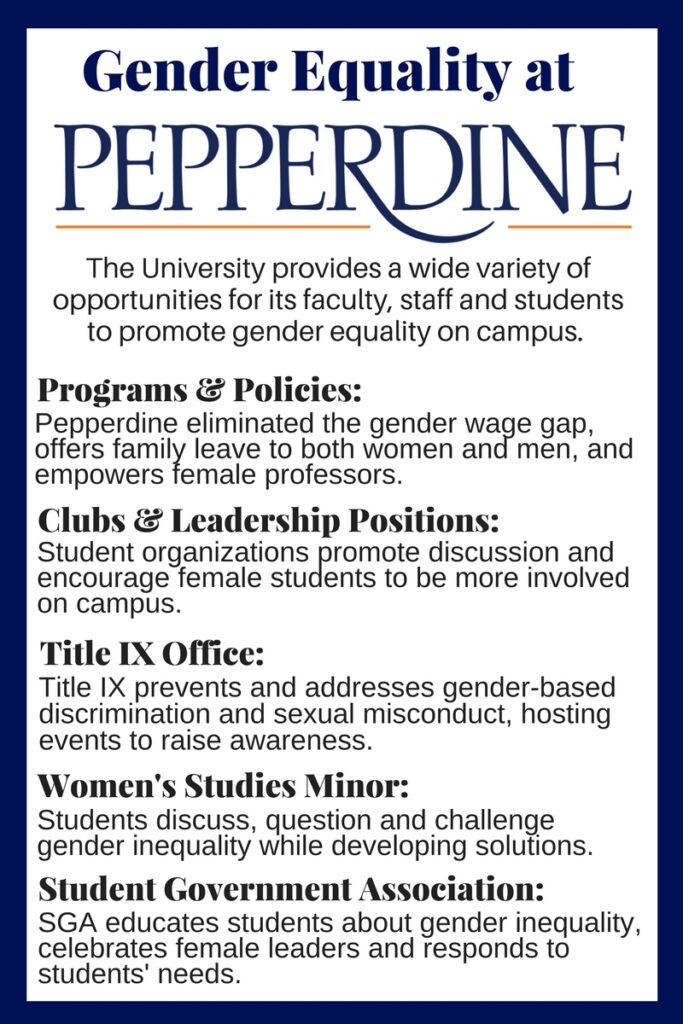
Pepperdine’s students, faculty and staff are working toward achieving gender equality on campus.
Through leadership opportunities, support from professors and programs, the institution and its student body promote discussion of and awareness about gender issues in order to fulfill the university’s mission statement.
“The notion of equality is at the core of a lot of educational enterprises,” Sociology Professor Robin Perrin said. “Whether you are male or female, everybody is honored, everybody is prized, everybody is fully capable of great things and that is the basic tenor (Pepperdine) began with.”
Although students still face challenges, the community strives to combat gender inequality through organizations such as the Title IX office, the Student Government Association, women’s studies and the Body Project. A Pepp Post poll of 52 students found that almost all support gender equality.
What gender-related issues do students face?

The poll found that Pepperdine students feel underrepresented in leadership, are concerned about the wage gap between genders and are afraid of sexual assault. More than 75 percent of students surveyed said they have experienced gender-based discrimination on campus.
Although the school is gradually promoting more female leaders, Gabrielle Pfund, a senior psychology and Hispanic studies major, said she is concerned about how the Church of Christ’s position on gender roles impacts the university. Pepperdine is affiliated with the Churches of Christ, where women are currently not allowed to hold preaching or elder positions. This patriarchy within the campus church can extend into the classroom and affect relationships between students, Perrin said.
For many students, their views on gender equality are closely tied to their religious beliefs.
“I believe man has a role and woman has a role and it doesn’t restrict them in their job or career,” said Christopher Chong, a senior creative writing major. “I think God intended women to do what works best for them and what works best for men, and there is a difference.”
Students are concerned with sexual oppression, harassment and double standards, and are often afraid to discuss gender, said Tanya Hart, associate professor of history and women’s studies coordinator.
There is a lack of understanding around Title IX and the definition of sexual assault among the student body, said Isabella Ordaz, a senior political science major.
Students also struggle with gender expectations. One common stereotype is that females major in communication while males major in business administration, which is perceived as more research-intensive, said Kevin Gordon, a junior economics and political science major.
Some male students do not respect the intelligence of female students, said Kyla Lucey, a first-year international studies major who has experienced condescending remarks. She said males often assume she does not understand complex ideas and explain them to her in a condescending way.
How does Pepperdine promote gender equality?

Although the administration is male-dominated, Pepperdine’s policies are not patriarchal and administrators have largely abandoned gendered expectations, Perrin said. For instance, family leave is now available to male and female faculty and salaries are not affected by gender.
The Office of the Chaplain “enable(s) men and women to grow into a deeper spiritual maturity” and several students agreed that it fosters gender equality. They host series such as Faith and Feminism and Step Up Against Sexual Assault.
The Committee on Female Faculty and the Center for Women in Leadership educate and empower females professors at Pepperdine, promoting equality through mentorship, research and dialogue.
According to its website, Title IX — Pepperdine’s office for sexual misconduct response and prevention — “affirms that all members of our community are created in the image of God and therefore should be treated with dignity and respect.” It ensures that no one is discriminated against due to gender. The poll found that students believe it is the most effective on-campus effort.
The Student Government Association’s Women’s Initiative is a committee that raises awareness about gender inequality and “responds to the need to organize around celebrating and empowering women on campus,” said Ordaz, SGA’s executive vice president, who chairs SGA’s Title IX Committee and formerly chaired the Women’s Initiative.
The Women’s Initiative hosted the Women Making Waves campaign and banquet to honor female students and partnered with Title IX and Health and Wellness to organize Take Back the Night, an event dedicated to ending gender-based violence.
Pepperdine promotes equality by providing forums to discuss gender issues.
“What the university does … is give us open spaces where people can have discussions and learn more and ask more and think more,” Hart said.
The women’s studies minor — which emphasizes diversity and social justice by discussing women’s roles — allows students to ask questions and get answers. Students “use what (they’ve) learned historically and contemporarily about gender inequality to try to change things,” Hart said.
Pepperdine’s GEs, especially sociology, humanities and religion, raise awareness about gender issues and the importance of women’s roles. Students agreed that the faculty and staff are a major contributor to gender equality, by respecting all students, being receptive to conversations and encouraging students to be more active.
Professors “mentor student leaders … and nurse empowerment into them,” Ordaz said. “I have had countless female mentors since I have been at Pepperdine who responded to my enthusiasm about supporting women and women’s equality with such passion and such love and support. … Pepperdine is doing a really awesome job with hiring (them).”
All of the resources that Pepperdine provides to combat gender equality on campus make it easier for students to deal with sexism in the real world, Gordon said.
How do students promote gender equality?

Pepperdine provides many opportunities for women to fulfill leadership positions, which normalizes equality, said Lucey, who is one the few females on the debate team and Model United Nations. These clubs give her the confidence to make a difference through law or politics, where women are underrepresented.
“It is important to support women in leadership because Pepperdine’s mission is to teach its students purpose, service and leadership and that includes its female students,” Ordaz said.
She uses her SGA platform to advocate for greater gender equality on campus, improving policies to address students’ needs.
The Body Project is a student-led program designed to empower women through body positivity. It “combats the idea that as women, we are how we look,” said Pfund, who is one of the program’s leaders.“When you have the opportunity to leave someone feeling stronger than they were before, take it because it starts a wave of empowerment.”
Gordon, who gave a speech on the gender pay gap in his communication class and published research about masculinity in the Global Tides journal, thinks it is important for males to be involved in gender equality because everyone deserves to be heard.
“The school is really good at attracting students who are very open, very accepting, and very loving,” he said. As a result, the student body “has open ears to everything and that includes gender equality.”
The increasing interest in gender issues and willingness to listen to different perspectives also shows Pepperdine’s progress. The poll found that students primarily advocate for equality by raising awareness about the issues around them.
The fact that students are “not denying that (inequality) happens and are becoming active participants for social justice” is very encouraging, Hart said.
How can Pepperdine improve?

Although Pepperdine’s faculty and staff are making an effort, the poll found that the majority of students are unsure of whether or not Pepperdine effectively combats gender inequality on campus, showing that there is always room for improvement.
Perrin said he hopes that Pepperdine will create a child care facility on campus, since family responsibilities disproportionately affect women.
Students and faculty agree that some members of the Pepperdine community still struggle with misconceptions about the definition of feminism.
“I think some people believe that gender equality is unnecessary because they have not been educated about it,” said Nicole Bouzaglo, a first-year business major. “They think it would only benefit women, but it really would benefit everyone.”
Students are very engaged in addressing issues through protesting and often prompt the administration to take further action, but both end up dropping the ball, Hart said.
Although there are many students who are passionate and outspoken about gender equality among their friends, Ordaz is concerned with the absence of a feminist club and a Student Affairs department for gender equality on campus.
“If you really want to get to the root of an issue, one of the most valuable things you can do is have conversations in small groups,” Pfund said. “A strong community where people can be themselves and have those hard conversations is what empowers people and enacts change.”
Pepperdine desperately needs to continue discussing gender inequality, Hart said. She encourages students to foster equity by questioning society, listening to people who are different, participating in organizations and realizing that God wants to work through everyone’s lives to bless others.
“We seek truth, we don’t discriminate,” Perrin said. “We have those as our canons of belief and I think we all win — certainly women win — in a society where they are not limited in what they can do and who they can become.”
Makena Huey completed the reporting for this story under the supervision of Dr. Christina Littlefield and Dr. Theresa de los Santos in Jour 241 in spring 2018. Dr. Littlefield supervised the web story.




